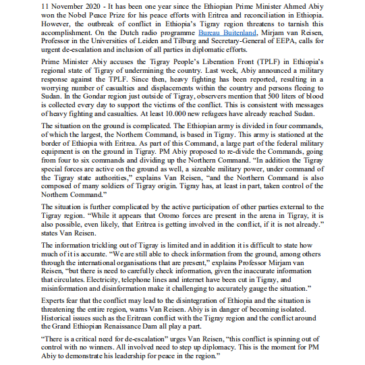Press Briefing: Ethiopia on the edge of civil war as the international community calls for de-escalation
11 November 2020 – It has been one year since the Ethiopian Prime Minister Ahmed Abiy won the Nobel Peace Prize for his peace efforts with Eritrea and reconciliation in Ethiopia. However, the outbreak of conflict in Ethiopia’s Tigray region threatens to tarnish this accomplishment. On the Dutch radio programme Bureau Buitenland, Mirjam van Reisen, Professor in the Universities of Leiden and Tilburg and Secretary-General of EEPA, calls for urgent de-escalation and inclusion of all parties in diplomatic efforts.



